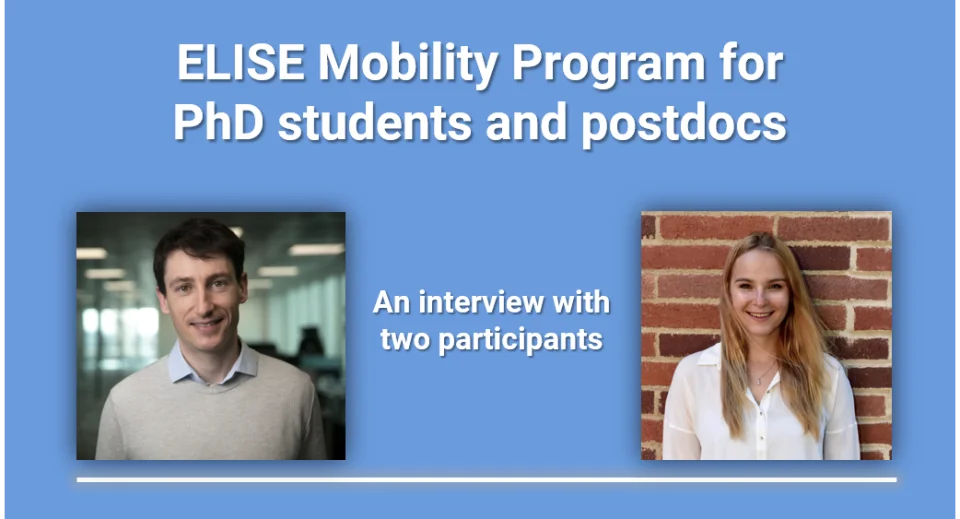



ELISE Mobility Program for PhD students and postdocs: Two participants share their experiences
ELISE is a network of AI research hubs and associated Fellows which originated from and closely cooperates with ELLIS. The ELISE Mobility Program for PhD students and postdocs supports short- and long-term research visits in the network, covering travel costs of up to 2,500 EUR per researcher for an international exchange during their PhD or postdoc appointment. Since the program’s inception, more than 50 applications have been approved, giving young talent the chance to connect with some of the best AI labs in Europe.
Two researchers who were granted support from the PhD and postdoc mobility program are Clémentine Dominé and Johannes Brandstetter.
Clémentine Dominé is of French nationality and currently doing her PhD at the UCL Gatsby Computational Neuroscience Unit in London (UK). The 24-old focuses on theoretical neuroscience and machine learning, and used the mobility grant for a 3-month research visit to the Sapienza University in Rome (Italy).
Johannes Brandstetter is a Senior Researcher at Microsoft Research Amsterdam (the Netherlands) under the umbrella of Microsoft's AI4Science initiative. His research has spanned a range of topics from geometric deep learning, graph-structured learning, reinforcement learning, few-shot learning to particle and high-energy physics. Before joining MSR, Johannes was an ELLIS postdoctoral researcher at the Amsterdam Machine Learning Lab (AMLAB), and before that at the Johannes Kepler University in Linz (Austria). He did his PhD at the CMS experiment at CERN (Switzerland) investigating Higgs boson decays.
In this interview the two scientists share with us how they experienced their research exchange within the ELLIS/ELISE network.
Both of you successfully applied to the ELISE Mobility Program for PhDs and postdocs. How did you use your respective grant? Which collaborations and contacts were you able to initiate?
Clémentine Dominé: “As part of my PhD at the UCL Gatsby Unit I had to do a research exchange of up to four months at a different lab. I used the ELISE mobility grant to study three months at the Sapienza University in Rome. The grant helped me to pay for my travel costs and the accommodation there. In Rome I focused on geometric deep learning for antibody-antigen binding prediction - a research field which is key for the development of vaccines and synthetic antibodies and quite different from my actual field of study. Despite the small period, I had the opportunity to bond with researchers there such as Marco Pegoraro. This led to our ongoing collaboration on a publication and the potential for lasting collaborations.”
Johannes Brandstetter: “The ELISE mobility grant gave me the opportunity to cover expenses related to my ELLIS postdoctoral exchange at the Amsterdam Machine Learning Lab (AMLAB). This stay allowed me to dive into the deep learning hub Amsterdam, meet and work with amazing people, and finally to establish my own line of work, which, broadly speaking, uses deep learning to accelerate and improve computational simulations such as weather forecasting or fluid dynamics. I closely worked together with people from AMLAB under the supervision of my host Max Welling who was involved in all my projects. For me, having the opportunity to relocate to Amsterdam, especially during Corona, when most of everyday’s life was at standstill, proved to be an amazing opportunity for my career, for which I am really grateful.”
What did you learn during these research visits?
Clémentine Dominé: “During my time in Rome I had the chance to work in a more practical setting, where I gained experience in handling real biological data (specifically, proteins). In London, my focus is usually on the theoretical aspects of the emergence of flexible learning in both biology and artificial intelligence. Through collaborations formed during my research visit, I also deepened my understanding of graph computations and analytical methods employed in geometric deep learning. Additionally, I began studying Italian while in Rome, and I have continued taking Italian courses here at UCL.“
Johannes Brandstetter: “My research visit to Amsterdam lasted for more than a year, before I joined Microsoft Research in Amsterdam, making it a permanent stay. I really tried to get out of my comfort zone and explore new research directions, enjoying having the freedom to fully concentrate on my own research. Most notably, I enjoyed working with amazingly smart people which seem to be in abundance in Amsterdam. This gave me the needed push to research areas which I long wanted to have a closer look into, but didn’t have the time or connections to give it a try. Each of my collaborations ended with new insights, new learnings, and most of all new friendships.”
What was your personal highlight of the exchange?
Clémentine Dominé: “Creating new connections with researchers outside my main field and establishing new professional and personal relationships were definitely highlights for me. But Rome itself was also just amazing. It is such a beautiful cultural city, and there is so much to see and visit. On your way to work you come across stunning churches and buildings with impressive architecture, stop by a cafe for a short espresso and delicious food where you encounter friendly and hospitable locals. It's the little pleasures that made living in Rome an enjoyable experience for me.
Johannes Brandstetter: “Whereas Corona kept Europe and the world at a standstill during most of 2021, we were exploring the Netherlands by bike, one new place at a time. That allowed me to put my research into perspective, and was the source for many ideas.”
Is there anything in particular you have taken away from the exchange for your current work?
Clémentine Dominé: “I am currently trying to bridge my research with what I have learned in Rome. I believe that some of the ideas of geometric deep learning could also be used in neuroscience. I am inspired by the successful applications of geometric deep learning in neuroscience such as methods to manifold learning in neural representation, data analysis of FRMI and EEG data sets or understanding invariants in different neural architectures. Moreover, I continue working with members of the lab on the antibody-antigen binding project as well as on the tentative organization of a workshop on unified representations across different neural models, both artificial and biological.”
Johannes Brandstetter: “I would say that my current work which I am doing at Microsoft Research is very much centered around or at least very similar to the topics which I started doing during my exchange at the Amsterdam Machine Learning Lab (AMLAB). More concretely, I work on the intersection of deep learning and physics, aiming to accelerate partial differential equation solving, fluid dynamics, and computational simulations.”
How to apply for a mobility grant
To apply for a grant from the ELISE Mobility Program for PhD students and postdocs, the following two conditions must be fulfilled:
The applicant is doing a PhD/postdoc at one of the ELISE partner institutions
The exchange is supported by two advisors in the ELLIS network from different sites: the advisor from your home institution, and the advisor from the host institution who will supervise the exchange. Both advisors must be members of the ELLIS network, and at least one of them an ELLIS Fellow/Scholar or Unit Faculty.
Eligible candidates must fill out an application form including a short project description and motivation for the pursued collaboration. Applications are possible year-round, but should be submitted no later than one month before the starting date of the exchange visit. The mobility program runs until July 2024.
More detailed information about the application process is available here.
The Mobility Program has received funding from the European Union’s Horizon 2020 research and innovation programme under ELISE Grant Agreement No. 951847.
More information
Visit Clémentine Dominé’s website here.
Visit Johannes Brandstetter’s website here.
To learn more about ELISE, visit this website.
Find more information about the ELLIS PhD Program here. For any questions, please contact phd@ellis.eu.

